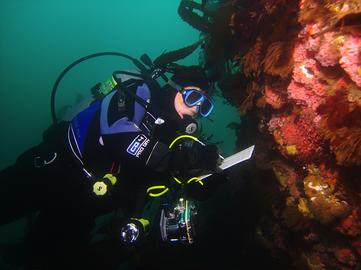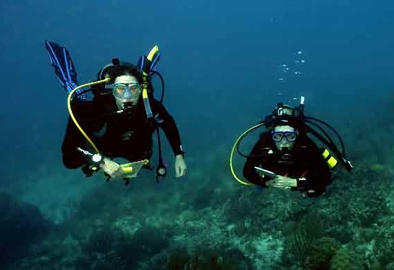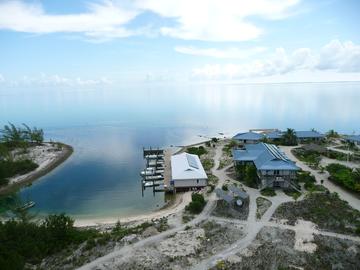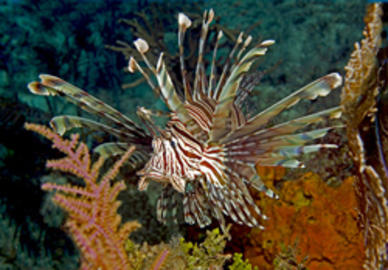Author: Christy Pattengill-Semmens, Ph.D., Director of Science
Every month, scientists, government agencies, and other groups request raw data from REEF’s Fish Survey Project database. Here is a sampling of who has asked for REEF data recently and what they are using it for:
- NOAA scientists from the Protected Resources Division are using data on three species of endangered rockfish to evaluate their status in the Salish Sea.
-University of Washington scientists are using REEF data on invasive tunicates to map distribution of the species throughout the Pacific Northwest.
Author: Sasha Medlen, REEF Membership Coordinator
REEF members are at the heart of our grassroots marine conservation programs. Over 43,000 divers, snorkelers, students, and armchair naturalists stand behind our mission.
This month we highlight Sally Davies (REEF member since 2004) and her sister Helen Davies (REEF member since 2006). Collectively they have conducted 100 surveys, and both participated in the recent inaugural South Pacific REEF Trip (more on that next month!). Here's what Helen had to say about REEF:
When and how did you first volunteer with REEF or become a REEF member? How did you first hear about REEF?
Sally was first introduced to REEF by a colleague of hers, Neil Ericsson. The combination of science and nature combined with a desire to contribute something of value made REEF an excellent fit. Sally took her first REEF trip to Bonaire in 2004. It was a true whirlwind trip since hurricane Ivan blasted through, taking with it the dive dock at Buddy Dive. After her first trip with REEF, Sally was “hooked” and she started lobbying me (Helen) to learn SCUBA diving. Her persistence paid off and in 2006 I took my first REEF trip to Belize.
If you have been on a REEF Field Survey, where and what was your trip highlight?
I think the most memorable moment for me was on a trip to St. Vincent diving with Bill Tewes. We were in about 20 ft of water and off in the distance I could see something dark near the sand. It was a group of about 7 flying gurnards digging through the sand with their pectoral fins, it was like something out of a science fiction movie, I’ll never forget it.
What inspires you to complete REEF surveys? What is the most interesting thing you’ve learned doing a REEF fish survey?
When I started surveying I was a new scuba diver still learning how to dive so learning both diving and underwater surveying took some time. However, once I learned how to ID the fish and see my data on-line, I began to get excited about adding to a much larger mission. REEF survey data are used by scientists and others all over the world to help better understand our planet. Pretty cool! It's great being part of an organization of conservation minded folks who are keenly interested in our oceans. My favorite fish is the secretary blenny in those blenny condos! The cirri get me every time!!
Do you have a favorite local (or not) REEF field station or dive shop?
My local San Francisco dive shop is Bamboo Reef. They’ve been in business for 50 years and Sal Zimitti who started the business is still diving in California waters. They are incredibly professional and knowledgeable and fun!
Do you have any surveying, fishwatching, or identification tips for REEF members?
Take a point and shoot camera, it will really help you learn the fish. Also, keep working at it, the surveying gets much easier with practice.
Author: Alecia Adamson, REEF Field Operations Coordinator
REEF is proud to partner with over 130 dive shops, dive clubs, individuals, and other organizations as REEF Field Stations.
The Cape Eleuthera Institute (CEI), a marine research facility, is located at the south end of Eleuthera in the Bahamas. Much like REEF, CEI realizes the importance of collaboration and encourages students, visitors, and community members alike to partake in ongoing scientific research with the overarching goal of marine conservation.
CEI works closely and shares facilities with the Island School, a semester abroad program for high-school students. All of the research programs that operate out of CEI teach a project-specific research class each semester to the students. REEF surveys have been successfully incorporated into a number of these projects. Most notably, the Patch Reef Ecology project uses REEF surveys for long-term monitoring of fish communities that are resident to the network of patch reefs in Rock Sound, the vast, watery, “backyard” of CEI. REEF surveys have been used to collect reef fish species and abundance data for this project for nearly a decade now! Students assisting with the data collection learn Caribbean reef fish ID skills and become well versed in the REEF Roving Diver Method. All data collected by students are contributed to the REEF database and available for use by others.
Most of the reefs that are surveyed by students are located in shallow waters adjacent to mangrove creek habitat. These reefs are small, isolated coral heads that provide important transitional habitat for many reef species that begin their life in mangroves and eventually head to deep water to reproduce. Due to their location and abundance, these reefs are easy to access and make great project sites for conducting research. In fact, Lad Akins, REEF’s Director of Special Projects, and Stephanie Green of Simon Frasier University, are conducting a long-term research project monitoring lionfish impacts on reef fish communities using a network of these shallow scattered patch reefs. Skylar Miller, employed by both REEF and CEI and based in Eleuthera, is responsible for monthly data collection for this important project.
Author: Lad Akins, REEF Director of Operations
Lad Akins, REEF Director of Special Projects, recently co-authored a paper summarizing work documenting feeding patterns of lionfish in the Bahamas. Understanding the predation behavior of this invasive species is important to be able to predict and mitigate the effects of Indo-Pacific lionfish (Pterois volitans) on Caribbean fish communities. Lad and his colleagues at Simon Frasier University studied the activity levels and prey consumption rates of lionfish on 12 shallow coral reefs in the Bahamas in relation to time of day and prey availability. Lionfish predation rates and activity levels were significantly higher during crepuscular (dawn and dusk) periods than at mid-day. Available prey fish biomass was highest at dawn but lower at mid-day and dusk, suggesting that lionfish predation activity is not limited by prey availability alone. The calculated average daily prey consumption rates was ~3 times the estimates obtained from studies of captive lionfish in their native range and of invasive lionfish observed only during the day. These results will help to predict more accurately the effect of predation by invasive lionfish on native reef fish communities. The study was published in the scientific journal Marine Ecology Progress Series, Vol. 433. A summary of this and all other scientific publications that have included REEF data and programs are given on the Publications Resources page, at http://www.reef.org/db/publications.
Author: REEF Staff
REEF Field Surveys are a great introduction to fish identification for novice fishwatchers, and are a fun way for experienced surveyors to build their life list while interacting with fellow fishwatchers. REEF staff, board members, and other REEF instructors lead these trips, and each features daily classroom seminars and a full diving schedule. Don't miss out, spaces are filling up for our 2012 trips. The schedule and more details are posted online at www.REEF.org/trips. We have an exciting lineup of destinations planned and we hope you will join us. 2012 destinations and dates:
Nevis, April 21-28, led by Christy Pattengill-Semmens Belize, lionfish expedition aboard the SunDancer II, May 26-June 2, led by Lad Akins and Peter Hughes San Blas Islands in Panama, June 9-16 and June 16-23, led by Paul Humann Dominica, lionfish research trip, July 14-21, led by Lad Akins San Salvador in the Bahamas, July 29 - August 4, led by Paul Humann Sea of Cortez/Baja Mexico, aboard the Rocio del Mar, September 22-29, led by Christy and Brice Semmens Hornby Island in British Columbia*, September 26-30, led by Janna Nichols Bermuda, October 6-13, led by Ned and Anna DeLoach British Virgin Islands, aboard the Cuan Law, November 11-17, led by Heather George Cozumel, December 1-8, led by Tracey Griffin
To inquire about a trip and to reserve your spot, contact the REEF Travel Consultant at Caradonna, 1-877-295-7333 (REEF), or via e-mail REEF@caradonna.com. *Hornby Island trip is being booked directly with the resort; contact owner/operator Amanda at info@hornbyislanddiving.com, or 250-335-2807.








